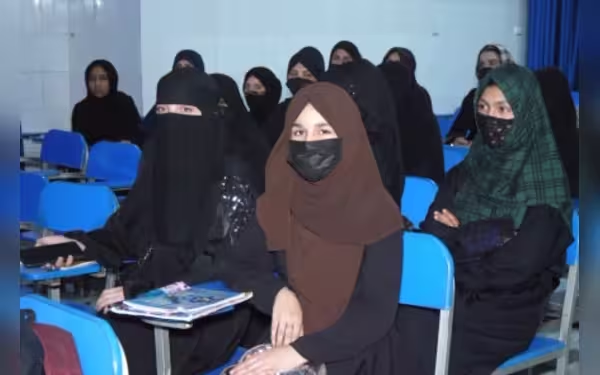Saturday, November 16, 2024 07:35 PM
Otunbayeva Highlights Afghan Girls' Education Crisis on International Day
- Afghan girls face over 1,120 days of education ban.
- UN urges immediate action for girls' educational rights.
- Hafasa's story exemplifies the personal impact of the ban.
 Image Credits: thefrontierpost
Image Credits: thefrontierpostRoza Otunbayeva highlights the ongoing education crisis for Afghan girls on International Day of the Girl, urging immediate action for their rights.
On October 11th, the world observes the International Day of the Girl, a day dedicated to recognizing the rights and challenges faced by girls globally. However, in Afghanistan, this day is marked with profound sorrow and concern. Roza Otunbayeva, the Special Representative of the Secretary-General and Head of UNAMA, highlighted the grim reality for Afghan girls, who have been subjected to a ban on education for over 1,120 days. This situation has not only deprived girls of their right to learn but has also pushed the country backward in terms of gender equality and human rights.
Otunbayeva expressed her deep concern, stating, "With each passing day, girls and women in the country suffer more." She urged the interim government to change its current course, emphasizing the need for immediate action to restore educational opportunities for girls. Her call to action resonates with many, as she reassured Afghan women and girls, saying, "I promise to Afghanistan’s women and girls that we will not cease to speak up for them, even when others seek to silence them." This commitment is crucial, especially in a time when the voices of many are being stifled.
In support of this cause, Zakiullah Mohammadi, a university professor, remarked, "If they are willing to grant these rights to our sisters, the Islamic Emirate can establish good relations with the world and even gain international recognition." This statement underscores the potential for positive change if the rights of girls are prioritized. The British Embassy for Afghanistan also joined the chorus of support, emphasizing the importance of education for Afghan girls. They stated, "Today is International Day Of The Girl. We celebrate the strength, resilience and potential of girls in Afghanistan. Despite the challenges, their dreams remain vibrant. The UK supports their right to education, health, and a future of their choosing."
Salim Paigir, a political analyst, poignantly noted, "Every day the doors of schools remain closed to girls, I believe that we will not be able to make up for this. After three years, this loss is irreparable." This sentiment reflects the urgency of the situation, as the longer the ban continues, the more difficult it becomes to recover lost educational opportunities.
Among those affected is Hafasa, a thirteen-year-old girl who was once a seventh-grade student. She has been working in a tailoring workshop with her mother for the past year, a stark contrast to her dreams of becoming a doctor. Hafasa shared her feelings of despair, stating, "I was a seventh-grade student when I could no longer attend school, and I have been working here for a year now. I wanted to become a doctor." Her story is a heartbreaking reminder of the personal toll that such policies take on young lives.
While the Islamic Emirate has yet to comment on the ongoing situation, they have consistently claimed that women's rights are being ensured and that the ban on girls attending classes is temporary. However, the reality on the ground tells a different story, one filled with uncertainty and lost potential.
The UN General Assembly established October 11th as the International Day of the Girl in 2011, aiming to promote girls' rights and address their challenges worldwide. As we reflect on this day, it is essential to recognize the resilience of Afghan girls and the urgent need for collective action to restore their rights. The future of a nation depends on its youth, and by investing in the education and empowerment of girls, we pave the way for a brighter tomorrow. It is a call to action for all of us to stand in solidarity with those who are fighting for their right to education and a better future.













